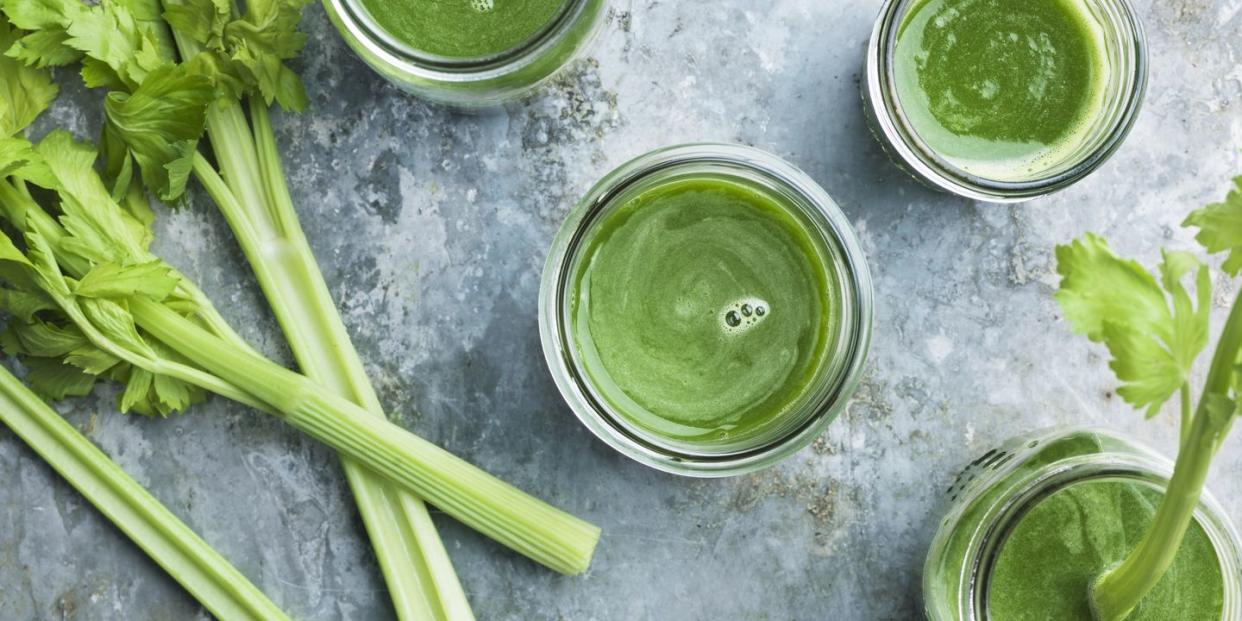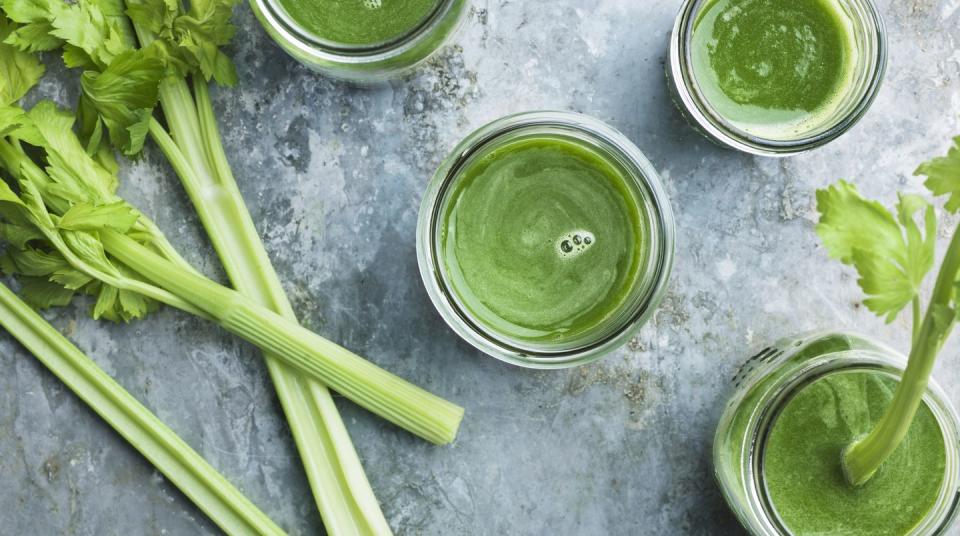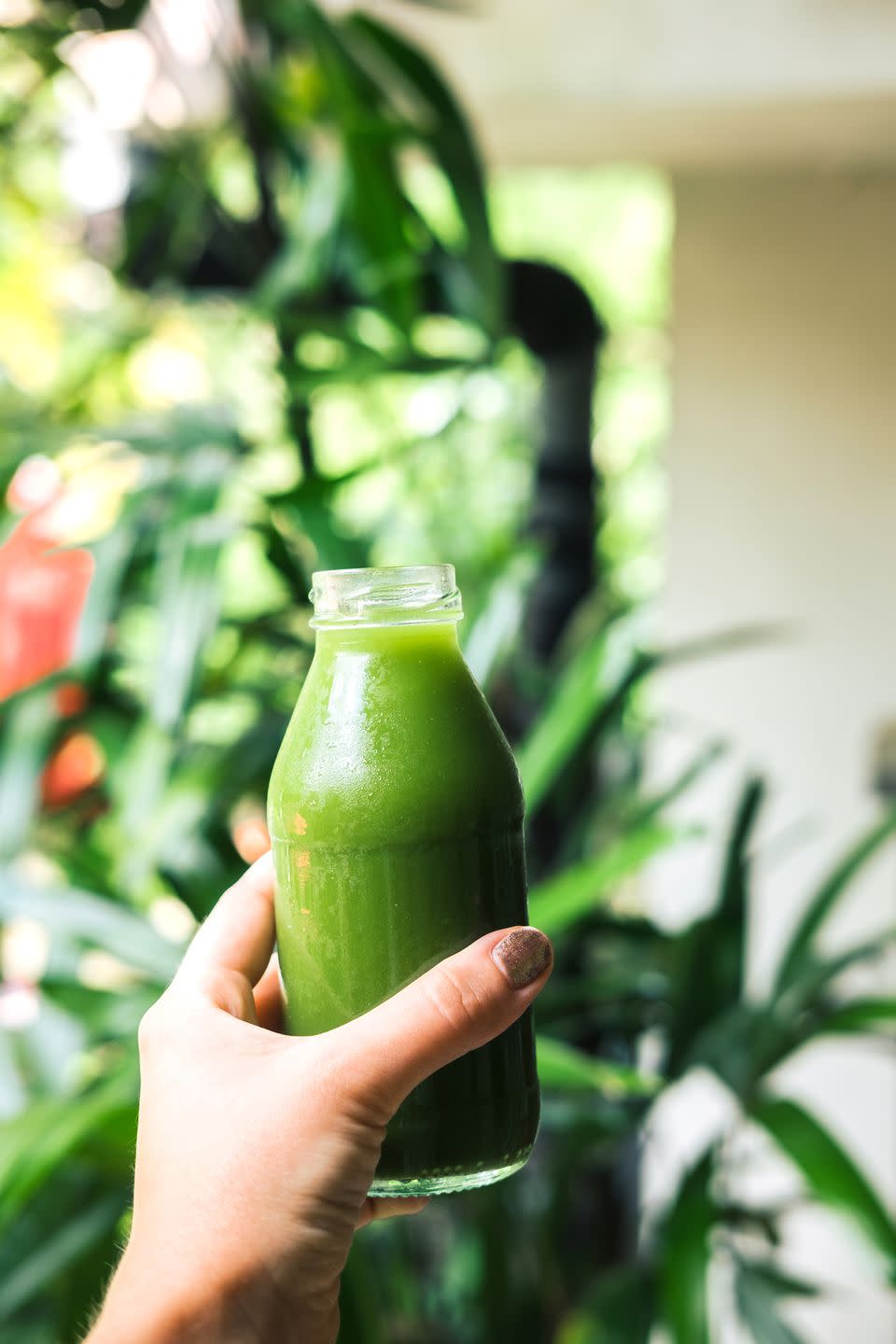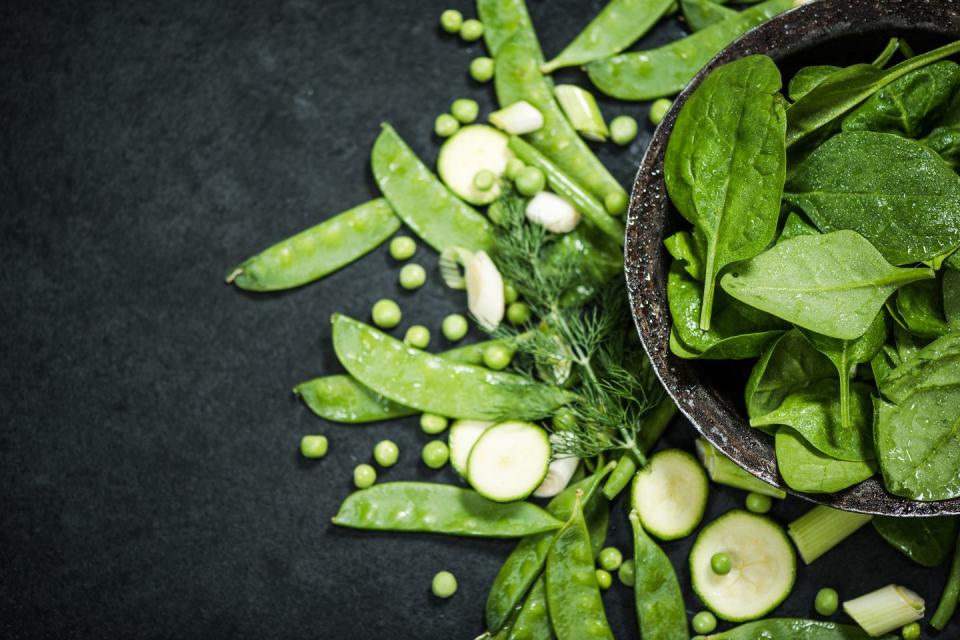Celery Juice Is the Latest B.S. Diet Fad Taking Over Instagram Right Now

Today, I am resigned to the fact that #celeryjuice is officially a thing. It has more than 68,000 tags on Instagram. This sad news means that anyone in the scientific community - e.g., registered dietitians, food scientists,and biochemists, to name a few - is mourning the loss of another nutrient-dense food turned "cure-all" by way of some A-list celebrity support and non-credentialed "practitioners" like medical mediums. We ask that in lieu of sending flowers, you’ll read below.
What is celery juice?
Celery juice is made by the blending and straining the oft-overlooked garnish and crudité. Proponents extoll the benefits of drinking celery juice on an empty stomach and avoiding cross-contamination with other green vegetables to maximize the curative, mystical powers of celery in its least wholesome form: juice.
From a nutrition standpoint, juice takes an otherwise wondrous gift from nature (produce!) and turns a phytonutrient-filled fuel into a concentrated source of sugar. No matter how much or how little sugar produce contains, juicing veggies and fruit yields a higher concentration per fluid ounce than you would eat in grams. So why are we drinking our nutrients from concentrated vegetable-derived sugar instead of eating stir-fry and moving on with our lives?! Various celebrity testimonials from the likes of Kim Kardashian and Debra Messing and have claimed it'll help with just about, well, everything.

Does celery juice help you "detox?"
So long as you have a functioning gut, liver, and kidneys, you're always detoxing - ridding your body of the gunk you just don't need - every minute of every day. Your GI tract begins in your mouth, and from there, enzymes in your stomach and intestine digest and absorb the nutrients you need and excrete what you don’t via your kidneys, liver, and lower GI tract.
The liver essentially deep cleans and sanitizes any "toxin" (something we’ve consumed in excess of what we can actually use) and converts it into other compounds used elsewhere in the body. If the liver can’t use a compound for other organ systems or functions, it often makes it into bile, a substance that helps you absorb needed nutrients from other foods.
When it comes to your diet, "detox" and "cleanse" are two terms being misused everywhere these days. Periods of extreme eating and juicing DO NOT EXPEDITE THE FUNCTIONS that your gut, kidneys, and liver already do all day, every day.
Trying a celery juice "cleanse" for the purpose of giving your liver a break is both:
A) antithetical to what the liver actually does
B) a bit like telling someone how to do their job - albeit, incorrectly
Your liver doesn’t need your help, celery! SORRY!
Does celery juice help with chronic inflammation?

Some celery juice enthusiasts cite "cluster salts" as the predominant benefit of drinking this veggie instead of chewing it. By breaking down these compounds into smaller molecular components for digestion, the theory is that cluster salts take on an "antiseptic, antibacterial" role in the body by "starving pathogens" and "reversing inflammation."
Given the limited scientific data available in humans, the remnants of your crunchy crudité provide antioxidants called flavones. It’s biochemically plausible that flavones could stop specific reactions in your liver that lead to abnormal, DNA-damaging processes in your body. And loads of well-established research have linked DNA disruption to increased risk of chronic disease through chronic inflammation.
Here's the problem: These things might occur in your body when consuming concentrated amounts of celery on an empty stomach, but the data is still limited on how bioavailable (actually usable) these compounds are in human beings. Most research so far has been performed on lab rats or in test tubes, so when I say that these cascades of reactions could, over time (not by swilling one 16-ounce bottle of celery juice!), help mitigate your risk of chronic disease, I say this with the caveat that simply because it’s biochemically plausible doesn’t make it applicable to your everyday life.
It isolates us from the fact that we’re humans who live in the world and not a laboratory. All of us have very different, unique lifestyles that lead to both protection and degradation of our body’s tissue cells.
Since we don’t live in a bubble, making the leap from "might benefit you if your body were a human test tube" to "CURES disease, fights inflammation, and starves pathogens that make you sick" is not just a leap - it’s abuse of existing data. It’s actively not taking into account what else we might eat in a day, week, or year.
Will celery juice help with weight loss?

Let's debunk another pervasive myth about celery: NEGATIVE CALORIES ARE NOT A THING. There’s no such thing as a free food, since all energy-containing foods and beverages provide some calories from carbohydrates, protein, and fat in varying degrees. Could you gain weight drinking celery juice? It's possible, especially when:
It’s provided to you in a less-filling format (juice vs. food)
With a higher concentration of calories (drinking concentrated simple sugar molecules vs. eating them)
And without the satiety and sensory component of actually eating a meal (vs. drinking a baby food recipe)
This is a phenomenon I call FNSS - full but not satisfied syndrome, and it thrives on diet culture’s adherence to the concept of "willpower" because it tricks us into believing that we can beat basic human biology. If you consume carbohydrates without dietary fat and protein, you’re likely to be hungry later on (it’s only natural!). The metabolic breakdown of protein, fat, and fiber is a slower, more intricate process that both provides you with fuel from a biochemical POV, and the sensory experience of eating. Without those nutrients, you’re primed for FNSS - you’re stuffed full of celery juice, but you’re just not satisfied.
This restriction feeds into a mindset that we have to limit something in order to achieve better health - and where does that thought actually land us?! Primed to dive head-first into the leftover donuts in the conference room and scooping up every last morsel of frosted cereal leftover in your pantry.
So, in both research and in my clinical experience: No, drinking meals versus eating them does not lead to weight loss. It actually has the reverse effect, and can trigger feelings of shame and isolation that come along with the restrict-binge-restrict cycle.
Instead, let’s relax. Do these things for better health and weight management in 2019, and I promise, you’re on the road to a healthier, happier year of eating real food and enjoying your meals and snacks without restriction - no juicing or detoxing required.
Pack on the produce. More veggies and fruit, more often - in their wholesome, closest to nature form as possible. This applies to fiber-full foods you actually chew, not the cold-pressed juice for $16.
Prioritize good-for-you fats: Use those plant-based oils when cooking more often.
Eat more seafood: Aim for about two to three servings weekly.
Choose 100% whole grains: farro, buckwheat, bulgur, wheat, and oats
Enjoy conscious indulgences: chocolate, sweets, and baked goods in moderation
Think inclusive vs. exclusive: Diets that are beneficial for long-term health prioritize inclusivity instead telling you what you can’t eat.
Provide enrichment of multiple varieties: cooking with herbs and spices, enjoying favorite restaurants, and trying new flavors
Drink unsweetened beverages - especially tea and coffee
FYI: Coffee provides one of the highest sources of antioxidants we can eat (er, drink!) And since you wouldn’t be reading this article if you weren't probably interested in drinking your antioxidants, coffee does provide a myriad of flavonoids in varying biologically available forms. People who drink 3-4 cups per day are at decreased risk of heart disease, cancers, Alzheimer’s disease, and diabetes than those who abstain, research suggests.
The Bottom Line
The best diets promote inclusivity over exclusivity and rely heavily on produce. Think about what works best for you before trying any new approach to eating, and use that as your framework for building healthier eating habits that stick.
For more ideas, tips, tricks, and healthier eating guides that’ll help you stick to your health-focused resolutions, check out our Nutrition Director’s new book: Dressing on the Side (and Other Diet Myths Debunked): 11 Science-Based Ways to Eat More, Stress Less, and Feel Great About Your Body
('You Might Also Like',)

